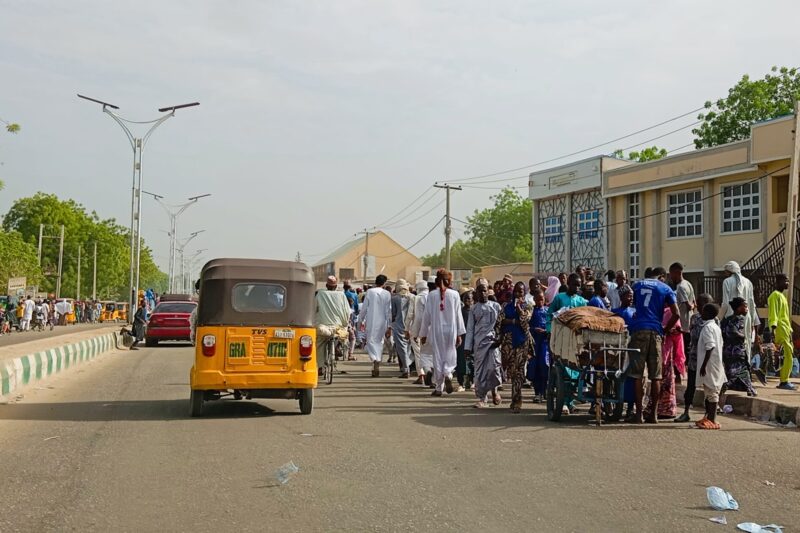As economic climate gets harsher, more people – particularly women, children and the disabled – are turning to begging to get food and money, saying it is the only way they will survive.
Despite a strict ban on begging, loitering or gallivanting, hundreds of people in Borno State have returned to the streets desperate to get money for food and other essentials.
The beggars – mostly women, children and people with disabilities – say the cost-of-living crisis has forced them to go back to the streets because that is their only means of survival.
The Borno State government banned street begging – including loitering and gallivanting – in October last year, saying anyone who violated the ban would be prosecuted.
At the time, Usman Tar, the state’s commissioner for information and strategy, said: “In Borno State, street begging and aimless loitering are not in our character. We are dignified people. This is to inform members of the public that, with immediate effect, the Borno State government has placed a strict ban on all street begging, loitering and gallivanting within and around the Maiduguri Metropolis and the Jere Local Government Area.”
The ban applied to all streets, public buildings, places of worship and commercial premises.
Beggars were told to find work instead of roaming the streets and “causing a nuisance”.
Although the streets remained quiet for a while after the ban was imposed, beggars soon started returning.
Ya Maida Bulama, a widow, begs on the streets of Maiduguri, the capital of Borno State.
“When my husband died, I was forced to beg on the streets so that I could look after my children.
“I know is not the right thing to do. I know the state government has banned all begging. But I do not have a choice. I used to work as a processor, sieving raw maize and millet, among other grains. But I lost my job.
“The many hardships and the cost-of-living crisis have forced me to start begging again. It is the only way I can support my family. It is not something I am proud of – I beg because I need money to feed my kids.
“It’s not safe to beg on the streets and it is humiliating. There is no dignity or prestige. My greatest wish is for the government to support me so that I can stop begging.”
Hajja Fatima said she started begging after her husband was arrested and detained in Giwa Barracks during the peak of the insurgency in Borno State.
“To be honest, I do not know whether the state government has banned begging on the streets. I stand on the roadside in Maiduguri every day and beg. I have never been stopped by any government officials.
“I used to make and sell caps. But I lost money and do not have enough cash to continue my business. My husband is in detention and I do not get any support from my family or his.
“The only way I can feed my children is if I beg. I am appealing to the government and humanitarian agencies for capital to start another business. I would give anything to be able to have a sustainable means of income.”
Sadiq Abatcha, a trader in the Post Office area of Maiduguri, told RNI that most beggars had returned to the streets, despite the ban.
“They come from internally displaced persons’ camps. They arrive early in the morning and take up spots at regular places. Others – many of them children – sleep on the streets at night and roam around the city during the day. They beg for food and money. Sometimes they pinch things from passers-by – and even from shops.
“When the government banned begging, the streets were quiet for a while. Slowly but surely, beggars started to appear again. Now there are many. Most have been hit hard by the harsh economic climate and can only survive by begging.
“The government needs to collaborate with non-governmental organisations, community and international agencies and law enforcement to develop and implement sustainable strategies.
“It should work with businesses to create employment opportunities specifically targeted at individuals who beg. This could include job-placement programmes, skills development initiatives and incentives for businesses to hire individuals from vulnerable populations,” Abatcha said.
“You see beggars – particularly kids – roaming the streets in groups. They beg passers-by for money and food. It affects our business because the beggars disturb our customers. Sometimes they steal. Customers say they do not want to come here anymore because they are continually harassed by beggars.”
Ibrahim Adam also trades in the Post Office area.
“When the ban was first put in place, there was not a single beggar to be seen on the streets. But gradually they have returned. In fact, I think there are even more beggars than before the ban was imposed.
“The government needs to intervene because it’s bad for business.
“The cost-of-living crisis is affecting everyone, particularly poor displaced people. They cannot afford even the basics. They are starving. Most beggars cannot find employment and so they will do just about anything to get food for their families.
“Many of the beggars are people with disabilities who have no other means of making a living. If they do not beg, they will starve.
“If the government does not do something urgently to ease the economic hardships of the people, more people will turn to begging to get food and cash. If the government seriously wants to stop begging, it needs to support the poor and disabled. If the government does not intervene, the problem will only get a lot worse.”
SHETTIMA LAWAN MONGUNO








